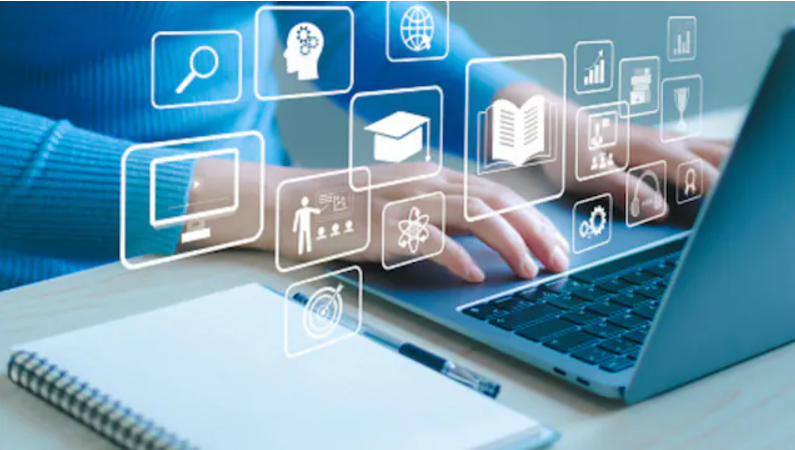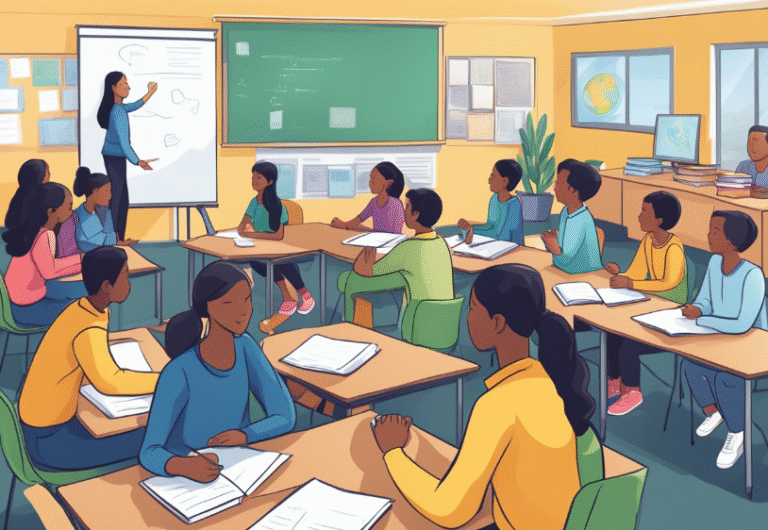The Future of Education: How Technology is Shaping Learning in 2025

Education has always been one of the cornerstones of societal progress, but over the last few decades, it has undergone rapid transformation, mainly driven by technological advancements. The year 2025 is on the horizon, and with it, the role of technology in education is expected to evolve dramatically. From virtual classrooms to AI-powered tools, technology is reshaping the learning experience for students, educators, and institutions alike.
In this article, we will explore the different ways in which technology is influencing education, what the future of learning will look like, and the exciting innovations that are just around the corner.
1. The Rise of Online and Hybrid Learning
The Growth of Online Education
Over the past few years, the global pandemic accelerated the shift to online learning, and the trend shows no signs of slowing down. By 2025, online learning platforms will continue to evolve and expand, offering more personalized learning experiences. Students can access educational resources from anywhere in the world, and institutions can reach learners from different geographical locations.
See also: freebookspot
Hybrid Learning Models
Hybrid learning, which combines in-person and online instruction, is gaining popularity. This model allows students to enjoy the benefits of both in-person interactions and the flexibility of online resources. The future of hybrid learning will involve seamless integration of both formats, where students can easily switch between physical classrooms and digital platforms.
2. Artificial Intelligence in Education
Personalized Learning Experiences
Artificial intelligence (AI) is one of the most transformative technologies in education. By 2025, AI will be deeply embedded in educational systems to personalize learning for each student. AI-powered learning tools can adapt to individual needs, identify strengths and weaknesses, and provide tailored content. This ensures that students receive the right level of support at the right time, improving overall learning outcomes.
Intelligent Tutoring Systems
AI will power intelligent tutoring systems that can provide personalized assistance to students. These systems can interact with students in real time, offering feedback, answering questions, and guiding learners through complex concepts. As AI continues to advance, these systems will become even more sophisticated, capable of understanding context and adjusting their approach accordingly.
3. Virtual and Augmented Reality in Education
Immersive Learning Experiences
Virtual Reality (VR) and Augmented Reality (AR) are set to revolutionize the way students experience education. VR can create fully immersive environments where learners can interact with 3D models, conduct virtual experiments, or explore historical sites. AR, on the other hand, overlays digital information on the real world, allowing students to interact with objects and concepts in ways that were previously impossible.
In 2025, VR and AR will be commonly used in classrooms to enhance understanding of complex subjects, such as science, medicine, and engineering. These technologies provide experiential learning, making it easier for students to grasp abstract concepts.
Hands-on Simulations and Field Trips
With VR and AR, students will be able to take virtual field trips to places that would otherwise be inaccessible. For example, they could visit the surface of Mars or explore the human circulatory system in 3D. These virtual simulations will help students gain practical experience and deep understanding, preparing them for real-world challenges.
4. Gamification and Game-Based Learning
Making Education Fun and Engaging
Gamification is the use of game design elements in non-game contexts, and it is becoming a powerful tool in education. By 2025, gamification will be a common feature in classrooms, with teachers using game mechanics such as rewards, levels, and challenges to increase student engagement. These elements make learning fun, motivating students to complete tasks and pursue knowledge at their own pace.
Educational Games for Skill Development
Game-based learning will also grow in popularity, where students can learn new concepts and skills through educational games. These games can range from simulations to quizzes, encouraging students to solve problems and make decisions in a dynamic and interactive environment.
5. Blockchain and Credentialing in Education
Securing Educational Records
Blockchain technology, which is known for its secure and transparent nature, is poised to revolutionize how educational credentials are stored and verified. By 2025, students will have the ability to store their educational achievements on a blockchain, making it easier for institutions and employers to verify their qualifications without the risk of fraud.
Smart Contracts for Education
Blockchain will also facilitate the use of smart contracts in educational transactions, such as scholarships, payments, and certifications. These contracts automatically execute predefined terms, reducing administrative overhead and ensuring more transparency in the process.
6. 5G and the Expansion of Remote Learning
Faster and More Reliable Internet
The rollout of 5G networks will significantly impact remote education. By 2025, the majority of the world’s population will have access to high-speed internet, which will make remote learning more effective. Students will be able to participate in live lessons without experiencing lag or interruptions, and educators will have access to advanced tools that require a fast and stable internet connection.
Expanding Access to Remote Education
With the rise of 5G, remote education will become more accessible to students in rural or underserved areas. The improved connectivity will allow students to participate in high-quality online courses and collaborate with peers from different parts of the world.
7. The Role of Teachers in the Future Classroom
Facilitators of Learning
Despite the increasing reliance on technology, teachers will still play an essential role in the future of education. In 2025, educators will transition from being the primary source of knowledge to becoming facilitators of learning. They will guide students through their educational journey, offering personalized support and encouraging critical thinking and problem-solving skills.
Embracing Technology in the Classroom
Teachers will be expected to be proficient in using various educational technologies, from AI-driven tools to VR and AR platforms. Professional development programs will equip educators with the necessary skills to integrate these technologies into their teaching methods effectively.
8. Data-Driven Decision Making in Education
Learning Analytics and Student Performance
As education becomes increasingly digitized, schools and universities will have access to large amounts of data. Learning analytics tools will help educators track student progress, identify trends, and make informed decisions about curriculum and teaching methods. By 2025, data-driven decision-making will be commonplace, allowing schools to provide more effective and efficient learning experiences.
Predicting Student Success
AI and machine learning will be used to analyze student data and predict academic success. These systems can identify students at risk of falling behind and recommend intervention strategies. By using predictive analytics, educational institutions can offer proactive support to students, improving retention rates and overall success.
9. The Impact of Social Media on Education
Collaborative Learning through Social Networks
Social media platforms are already being used in education to create collaborative learning environments. By 2025, students will be using social networks not only to communicate but also to collaborate on projects, share resources, and engage with experts from around the world. These platforms will foster global learning communities, enabling students to interact with peers from diverse backgrounds and cultures.
Peer-to-Peer Learning
Social media will also facilitate peer-to-peer learning, where students can help each other by sharing notes, answering questions, and offering support. This collaborative approach will enhance the learning experience and provide opportunities for students to learn from one another.
10. Ethics and Privacy Concerns in the Digital Classroom
Addressing Data Privacy
As technology continues to play a larger role in education, concerns about data privacy will need to be addressed. By 2025, schools and educational institutions will have to adopt stringent data protection measures to ensure the privacy and security of student information. Parents, teachers, and students must be informed about the data being collected and how it is being used.
Ethical Use of AI and Automation
There will also be ethical questions surrounding the use of AI and automation in education. Issues such as bias in algorithms and the impact of automation on jobs in education will need to be carefully considered. By 2025, educational institutions will need to create policies and frameworks to ensure that AI and automation are used in an ethical and responsible manner.
11. The Future of Education: Looking Ahead to 2025 and Beyond
A More Inclusive Education System
Technology has the potential to make education more inclusive by providing opportunities for students with disabilities, those in remote locations, and those who face socio-economic challenges. By 2025, advancements in assistive technology, such as speech recognition, text-to-speech software, and adaptive learning platforms, will enable all students to succeed in their education.
Lifelong Learning and Upskilling
In the future, education will be an ongoing, lifelong process. The rapid pace of technological advancements means that individuals will need to constantly upskill and reskill throughout their careers. By 2025, we will see an increase in micro-credentials, online certifications, and flexible learning pathways that allow people to continue learning well beyond traditional schooling years.
Frequently Asked Questions (FAQs)
1. How will AI impact the future of education?
AI will revolutionize education by providing personalized learning experiences, offering intelligent tutoring, and helping educators make data-driven decisions. AI will also automate administrative tasks, allowing teachers to focus on student engagement.
2. What role will virtual reality play in education?
Virtual reality (VR) will provide immersive learning experiences, allowing students to interact with complex concepts and explore places and scenarios that are not possible in a traditional classroom.
3. Will online learning replace traditional education?
Online learning will complement traditional education by providing flexible and accessible learning options. Hybrid learning models will combine the best of both worlds, allowing students to experience in-person and online learning seamlessly.
4. How will blockchain be used in education?
Blockchain will be used to securely store and verify educational credentials, ensuring that academic records are authentic and transparent. It will also enable the use of smart contracts for managing educational transactions.
5. What are the challenges of using technology in education?
Challenges include ensuring data privacy and security, addressing the digital divide, and making sure that technology is used ethically and responsibly in the classroom.
6. How can educators prepare for the future of education?
Educators should embrace technology, continuously upgrade their skills, and stay informed about the latest educational tools and methodologies. Professional development programs and training will help teachers effectively integrate technology into their classrooms.


